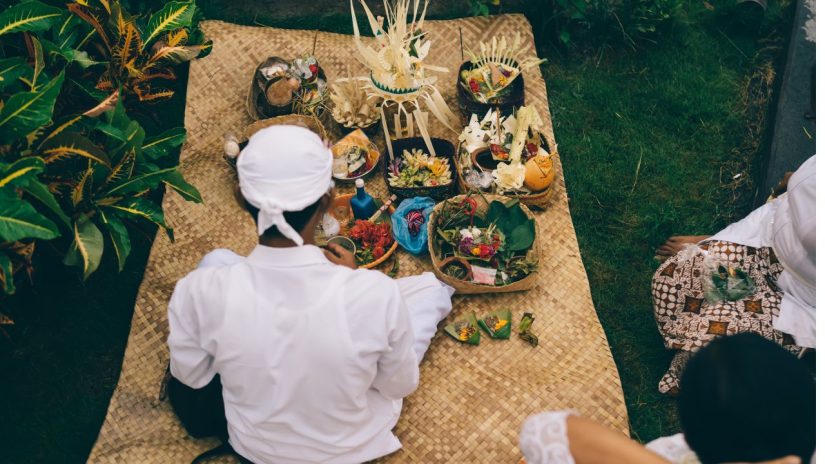
Athanasia Safitri
Apart from the plenary session about the Freedom of Religion and Belief (FoRB) which was conducted during the 5th International Conference and Consolidation on Indigenous Religions in Surakarta on 22-23 November 2023, there were three parallel panels about FoRB. It reminds us of the urgency in acknowledging the challenges facing many religious communities and citizens belonging to either the officially recognized religions or indigenous religions in Indonesia that they have had to endure. Thirteen speakers discussed the penal code, state policy, bureaucracy, religious and cultural values, interfaith marriage, and child custody throughout the two-day conference held in PUI Javanologi UNS.
The theme of the conference was ‘Democracy of the Vulnerable” where the voices of vulnerable religious and cultural groups were given space to voice their concerns. On one of the panels about FoRB for the marginalised, Muhammad Lutfi Hakim from IAIN Pontianak examined custody disputes involving parents of different religions, Rohit Mahatir Manese of IAIN Manado presented the emergence of religious value, and Zulfadli of Universitas Andalas Padang reviewed Law No. 17/2022 regarding the recognition and equality of citizenship of the local community of West Sumatra.
Religious freedom issues have many faces
Hakim was the first to present his findings in the FoRB panel and his discussion focused on the legal interpretation of ‘best interests of the child’ in religious courts related to custody of divorced parents of different religions. Verdict of custody was influenced by parents’ financial stability, availability of time, lifestyle; the children’s medical and psychological health; as well as education and religious upbringing. However, protection of children’s religious beliefs is the strongest argument and from his research of nine cases, Hakim highlighted that only two non-Muslim parents won custody and there are three cases tried in the Supreme Court. He strongly argued that religious affiliation can limit the rights that non-Muslims may hold, and that there has been violence to FoRB in favour of the Muslim parents.
The second speaker was Zulfadli who explained an indication of neglect of citizen equality in the province of West Sumatera. He started by giving the facts that the public only recognise Minangkabau as the West Sumatera local identity despite the existence of other ethnicities and tribes that are non-Minang. In addition to that, the distinct inequality was shown in the citizenship recognition in Law No. 17/2022 in West Sumatra Province, which was controversial and was objected to by the Mentawai people. Zulfadli continued that the resistance began since the Provincial Law seems to ignore the recognition of Mentawai ethnicity, customs, and traditions by favouring only the Minangkabau.
The panel continued with Manese who explored the history of the inclusion of the phrase ‘religious values’ as one of the considerations of human rights limitations in Article 28J of the 1945 Constitution. It certainly affects the practice of FoRB in Indonesia. Manese concluded that “religious values”, which are not included in the International Convention on Civil and Political Rights, were on the order of human rights restriction laws in Indonesia along with perceptions of public morality, security, and public order. Religious values then became exclusive since they only covered six official religions in Indonesia and ‘unusual religious values’ can be considered blasphemous. This restriction using considerations of ‘religious values’ affects the freedom of religion of minority groups in Indonesia, such as the Ahmadiyya community. It also affects the freedom of expression, as in the cases of Roy Suryo and Panji Gumilang, who were charged with blasphemy.
Voices of the vulnerable – how loud are they?
The inequality experienced by particular groups of vulnerable demonstrates that the road to free practice of religion, belief, or indigenous traditions still has a long way to go. The tendency of religious discrimination in child custody cases to the neglect of nonmajor tribes require further study to formulate a more universal policy and equal social order. Instead of establishing judgmental opinions and pointing fingers at one another, all parties especially the state have to work hand in hand with other organisations, institutions and religious or cultural communities to create more space for equal democracy in practice.
The Q&A session underlines the pivotal role of academic researchers in advocacy to give more space for indigenous religions and communities to grow and live in their existence peacefully and equally. Three presenters agreed on the need for more collaboration and discussions to acknowledge the problems we face related to freedom of religion and belief for religious groups and cultural minorities. Only through active participation will the change we all aim for will come to life.
